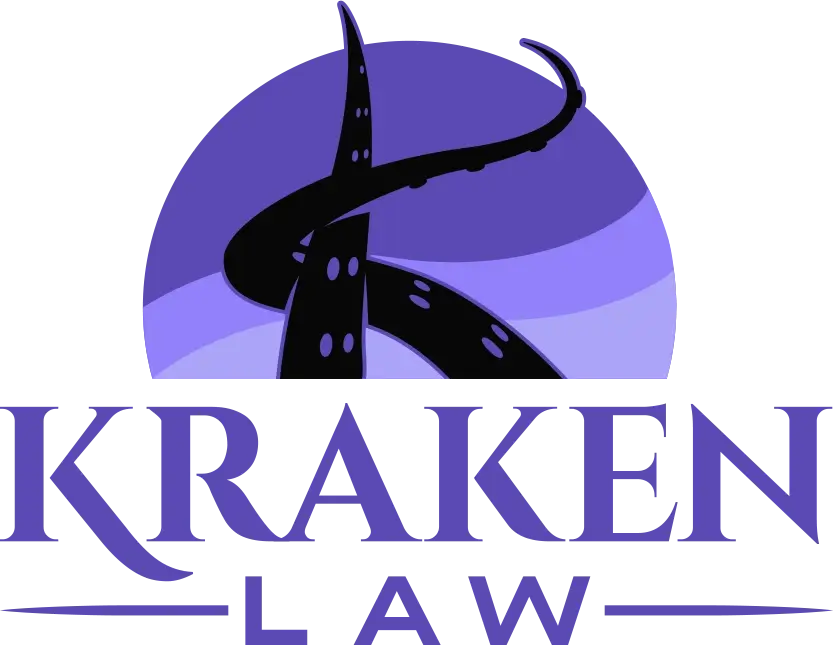We all want to work at our dream companies to enjoy a good salary and a safe workplace environment. That is why it can be disheartening to face unfair treatment at work.
Your ideal company may be engaging in workplace discrimination such as sexism at work. Such unfair treatment at work is illegal in the US.
Taking proper action against employee discrimination is a must to reduce bias in the working industry.
So learning about the signs of unfair treatment at work and how to prove it will help you. The good news is you can find all about it below.
What Is Unfair Treatment At Work?
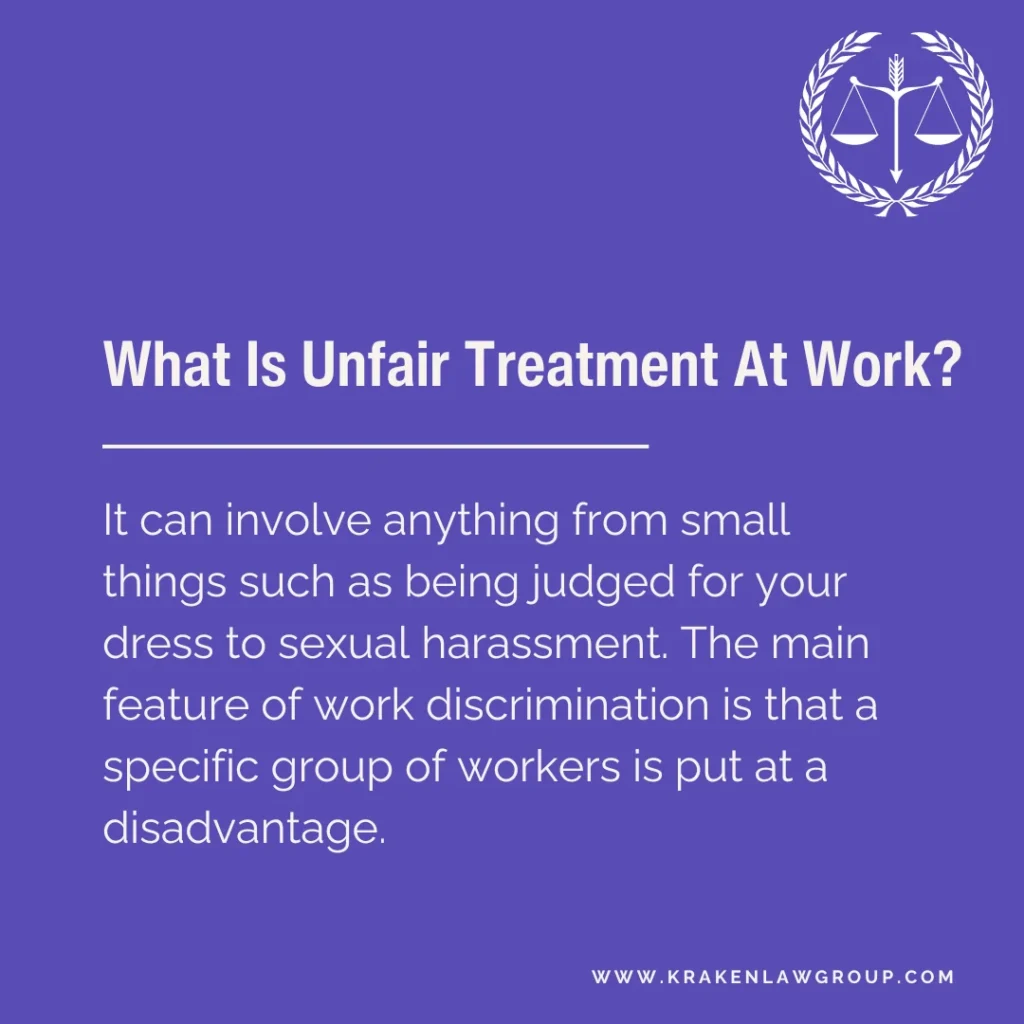
Unfair treatment at work may be called work discrimination or employee discrimination. It can involve anything from small things such as being judged for your dress to sexual harassment.
The main feature of work discrimination is that a specific group of workers is put at a disadvantage. This automatically puts other people in a favorable situation.
For example, a senior manager may pass you up for a long due promotion due to your gender. Simultaneously, they may give the same role to a less qualified worker, putting them at an advantage.
Examples Of Unfair Treatment At Work
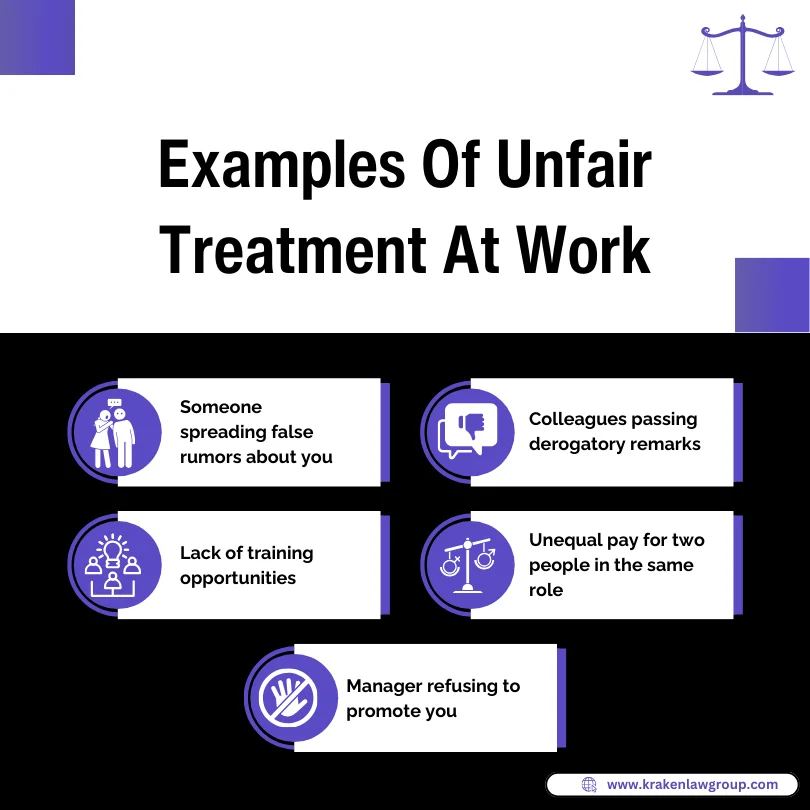
Understanding signs of discrimination will be easier if you know specific examples of unfair treatment at work:
- A company manager refusing to promote you unless you offer them sexual favors
- A recruiter canceling your hiring offer after learning about your future family planning thoughts
- Colleagues passing derogatory marks against a worker due to their gender, sexual orientation, race, or religion
- Lack of training opportunities for people belonging to a specific ethnicity
- Someone spreading false rumors about you
- Unequal pay for two people in the same role
- Refusing accommodations for pregnant employees or workers with disabilities
- Eliminating positions to remove specific people from the company
- Wrongful termination
Top 7 Signs Of Unfair Treatment At Work To Look For
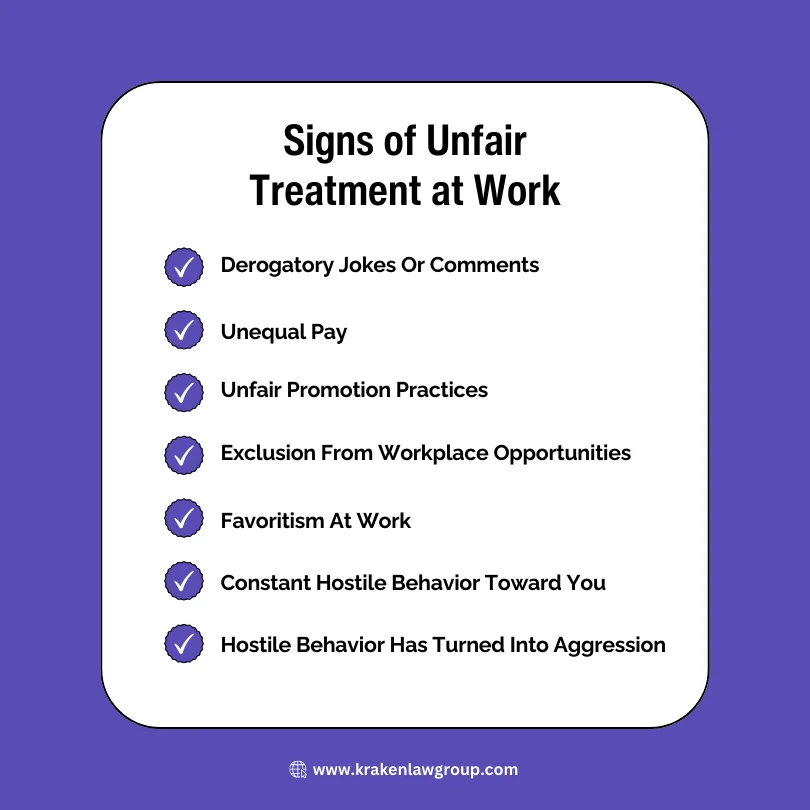
Let’s look at the top seven signs of unfair treatment at work to help you recognize this injustice:
1. Derogatory Jokes Or Comments
One of the common signs of unfair treatment at work includes derogatory jokes against you. A group of male colleagues may make sexual jokes about you when you’re near or behind your back.
They may also make explicit jokes about other things around you to make you uncomfortable. Some colleagues may also share their personal sexual stories, which can be inappropriate for the office atmosphere.
People may also use negative comments against you to undermine your confidence. For instance, a colleague competing with you for a promotion may spread false rumors at work.
This may lead to people calling you negative names and behaving inappropriately with you. If someone spreads infidelity rumors about you, colleagues may refer to you as a “homewrecker” or other words.
Your colleagues or bosses may also pass negative comments against your work tasks due to bias. For instance, they may always call your proposals to be “average” or “poorly written” without even reading them.
Managers at workers may also catcall you because of your gender. Such behavior is unacceptable in workplaces and can lead to consequences. So never stay quiet when you suffer from unfair treatment at work.
You may hire a workplace discrimination lawyer to understand examples related to derogatory comments.
2. Unequal Pay
In the US, female workers earn 16% less than their male colleagues. Such unfair treatment at work is called gender discrimination. Many companies believe male employees offer better performance because they mainly focus on their work instead of family planning and relationships.
That is not necessarily true, but the prejudice still leads to unfair treatment of women at work. You may receive a lower hourly pay rate than lesser qualified male colleagues.
Such difference between salaries leads to pay disparities at various companies. People identifying as queer may receive a lower salary than straight male and female workers at an office.
If a male worker makes $1 for a task, a female is likely to earn 84 cents for the same task. Black women are also paid less than non-Hispanic men at workplaces.
The Equal Pay Act has been enforced by the government to protect employee discrimination in this aspect. Despite that, many companies still engage in this unfair treatment at work.
Many organizations also believe that pay equity will not become a normal thing until 2056. If you’re suffering from a pay gap at your workplace, you may file a complaint with the EEOC to deal with it.
3. Unfair Promotion Practices
Unfair treatment at work also includes discriminating promotion practices. Senior managers at companies may pass on specific employees due to their gender, race, or sexual orientation.
For instance, black workers only make up 5% of the managerial workforce in the US. The total percentage of black employees working in the private sector is 12%.
This statistic proves that black workers are not promoted frequently, which is usually due to unfair promotion practices. Most workplaces prefer to have white people in senior positions.
These promotion practices may also be paired with gender or sexual orientation discrimination. For example, female workers receive a promotion less often than male counterparts.
Workers belonging to the LGBTQIA+ community may also not receive promotions regardless of their high performance. That is why workplaces need to implement policies against unfair promotion practices.
Some senior managers also abuse their power by asking for financial or sexual favors from junior workers. These signs of unfair treatment at work should encourage you to report injustices at your workplace.
File an internal or external complaint to deal with employee discrimination.
4. Exclusion From Workplace Opportunities Or Activities
Sometimes signs of discrimination may not be as obvious in a workplace. The company may not be engaging in a pay gap, but it may be marginalizing workers.
A team leader may assign you petty tasks to prevent you from focusing on your work projects. They may be doing that due to prejudices about your gender, sexual orientation, or other reasons.
For example, a team manager may send you on coffee and printing errands if you’re a female worker. They may also refuse to give any task to a queer employee on the team.
Exclusion from workplace activities is called marginalized treatment of workers. That is because not all workers suffer from unfair practices. Other examples of exclusion from opportunities include:
- Preventing specific workers from attending team meetings
- Making an employee work overtime on irrelevant tasks
- Senior managers treating a qualified worker as a personal secretary for running errands such as getting their home grocery
If a boss at work excludes you from training opportunities or other activities, you may file a complaint against them in the HR department.
Always check the policies of your company before reporting to ensure you’re complaining to the right person and department.
5. Favoritism At Work
An employer favoring a worker due to specific characteristics is a form of work discrimination. For instance, they may be more polite towards female workers who meet their beauty standards.
A senior manager taking a specific male worker to every company meeting and dinner may also be one of the signs of favoritism at work. Of course, not every characteristic is a sign of unfair treatment at work.
For instance, a senior manager praising an employee often or giving them tasks due to their good work ethic is not a sign of discrimination. Workers with high performance getting more project opportunities also don’t come under signs of favoritism at work.
This is why you must carefully observe the situation before accusing an employer of favoritism. One of the clear indicators of this injustice may be someone with low performance receiving important tasks.
A manager may also show favoritism towards a worker by assigning you someone else’s task to reduce the workload of the other employee.
In some cases, you may have to work overtime to complete the tasks of another colleague.
Another example of favoritism may be disciplinary action against a mistake that was overlooked when another worker made it previously.
6. There Is Constant Hostile Behavior Toward You
A hostile work environment can affect your psyche negatively and force you to quit your job. However, you shouldn’t be the one leaving your position due to an injustice. The person engaging in hostile behavior must suffer consequences through a lawsuit or internal complaint.
A hostile workplace is usually one that intimidates, scares, and makes its employees uncomfortable. Any type of harassment comes under hostile behavior at work.
The EEOC also states it is unlawful for workers to endure harassment at work. This is why you must always take action against your perpetrator instead of waiting out things.
Workplace hostility examples may include negative remarks against your appearance, proposals, or personal life. Colleagues may also be harsh against you by pushing you around.
A manager may also be hostile towards you by bullying you at work. They may:
- Make you work overtime frequently
- Assign you a deadline during lunchtime
- Prevent you from taking breaks
- Keep unnecessary one-on-one dinners with you using “work” as an excuse and make you uncomfortable
Such behavior must be consistent for it to be legally unlawful. One negative remark against your proposal may not be a sign of unfair treatment at work.
However, consistently getting bad remarks from a specific manager for your proposals can be an indicator of employee discrimination.
7. The Hostile Behavior Has Turned Into Aggression
When a hostile behavior turns physically or mentally aggressive, it meets the conditions of severe and harsh treatment of workers. By meeting this criterion, you can file a complaint with the EEOC more easily.
Remember aggression doesn’t necessarily have to be physical violence acts such as someone making you fall. It can also include spiteful verbal attacks on your personal life.
A manager’s behavior may also be cruel towards you. For instance, they may call you to the office on your off days. They may make you work overtime till late at night.
Bosses may also burden you with excessive work just to hurt you. Your safety may be at risk in some aggressive situations such as sexual harassment. It is okay to walk out of the office and quit in such raging moments.
However, you must also take action against the aggressive manager or colleague. Any person engaging in such hostile behavior will be violating the Title VII of the Civil Rights Act.
So they can be held liable in the court of your state for compensation and other forms of justice.
How To Prove Unfair Treatment At Work: 5 Steps Employees Can Follow
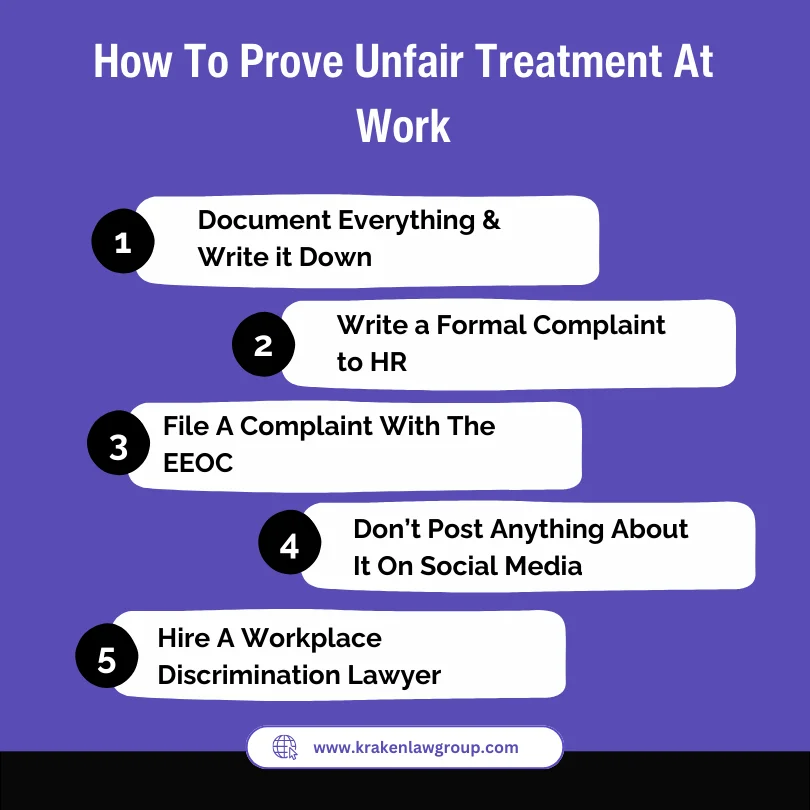
Here are the top five steps you can take to prove work discrimination:
1. Document Everything That Took Place And Write It Down
Documenting everything about your unfair treatment at work is highly important. You cannot prove signs of discrimination if you don’t remember the events accurately.
For example, you must be able to tell the exact date of the unfair treatment and the occurrence of events. If you don’t remember what happened properly, the defense may argue you’re making up things.
So every time you suffer unfair treatment at work, make a written record of it immediately. You may mention the date and time of the employee discrimination incident.
Always mention the name of the perpetrator with the incident. That is because you may suffer from unfair treatment at work due to different workers or employers.
You must also write explicit details of the event such as:
- How did the discrimination start?
- Indicators of bias
- How did the incident end?
These things will be highly helpful once you file an internal complaint or a lawsuit through the relevant authorities.
2. Write A Formal Complaint Letter To Your Human Resources (HR) Department
The HR department of a company deals with the recruitment of employees and different internal issues. If you suffer from signs of unfair treatment at work, you must send a complaint to the department.
Write an official letter with the purpose of the complaint and details of the unfair treatment. Sign that document and seal it in an envelope before handing it over to the HR department.
The department will then investigate your claim to see whether it’s true or not. If they find the accusation to be true, they may take action against your bully.
You should also read the policies of your company against workplace discrimination. Some workplaces have specific rules and departments to handle such complaints.
This means sending the complaint to HR may not be fruitful if another department manages work discrimination cases. A formal internal complaint is also beneficial if you file a lawsuit later.
That is because it can help you prove that your company didn’t take proper action to protect you from workplace injustices.
3. File A Complaint With The EEOC
The Equal Employment Opportunity Commission (EEOC) is a federal agency in the US that handles complaints of workplace discrimination. You may file a charge with them of gender identity discrimination or racism.
Any unfair treatment at work that violates the Civil Rights Act and other employment laws is managed by the EEOC. Once you file a complaint with them, they will investigate the issue.
If they don’t believe your claim to be accurate, they may issue you a suing notice that you can use to file a lawsuit against your employer. You will have to hire a lawyer and fight the case yourself.
However, if the EEOC finds your claim to be true, they may try to fix things themselves by coordinating with your employers. You may also receive a suing notice that will allow you to fight a lawsuit yourself.
4. Don’t Post Anything About It On Social Media
Staying away from social media is necessary when pursuing a case against unfair treatment at work. It may be difficult to remain calm due to a hostile office environment, but you must manage it.
Posting things about your discrimination events can put you at a disadvantage. That is because the defense attorney may use information on your accounts to highlight discrepancies in your statement.
They may also use other posts on your social media to justify the cause of termination. Every expert attorney also recommends victims suspend their social accounts temporarily.
This will prevent the other party from getting information through your social media accounts. If you don’t want to suspend your accounts, you must avoid talking about your case publicly.
Posting updates on your discrimination case may also help your employer’s lawyer file charges against you. For instance, the company may try to burden you with legal costs by filing a defamation case against you.
5. Hire A Workplace Discrimination Lawyer To Understand What You Can Do
The final thing you must do to prove your discrimination case is to hire a lawyer. An attorney will guide you about the organizations which you must file a complaint with for justice.
Typically, they will file your complaint with the EEOC. You can also file charges with the Fair Employment Practices Agency of your state. Once the investigation of these complaints is complete, you can start your lawsuit.
An expert attorney with you will help you prepare your statements for depositions and witness statements in court. Your lawyer will also deal with the proper filing of paperwork such as your written record of unfair treatment incidents.
The best thing is a lawyer will always give you reliable advice on compensation offers and whether you should continue pursuing the case for a bigger settlement.
Can You Sue Your Employer For Unfair Treatment At Work?
You can sue your employer for unfair treatment at work if you file a complaint with the EEOC. Consulting a workplace discrimination lawyer will help you fight the case.
If the case goes to court, the investigative findings of the EEOC may be brought to notice. You may also collect other evidence to prove your claim is true.
The EEOC also has specific deadlines that you must meet when filing a case against your employer. If you exceed the time limits, you may lose your right to pursue a lawsuit.
Remember if the court gives a verdict in your favor, you may receive financial compensation in punitive and other types of damages. This will depend on the specificities of your case.
FAQs
How Do You Respond To Unfair Treatment At Work?
You can respond to unfair treatment at work by warning the person against the treatment. Filing a complaint with the HR department right after the incident may help tackle bias at work. A lawsuit can also help you respond to unfair workplace treatment.
When Are Bosses Unfair?
Bosses may be unfair when they treat you differently because of your gender, appearance, race, or other personal aspects of life. They may offer you less salary or deny you promotions. These two are classic examples of unfair treatment at work.
When Does A Boss Show Favoritism?
A boss may show favoritism when they are excessively polite to a specific worker. Assigning that employee’s tasks to other people is also one of the signs of favoritism. Your boss may also promote a less qualified newbie in just a few months of employment due to favoritism.
How Do I Stop Being Treated Unfairly?
You can stop being treated unfairly by calling out your employers for their inappropriate behavior. Filing a complaint with the HR department or EEOC may also stop unfair treatment at work.
Contact A Workplace Discrimination Attorney To Report Unfair Treatment At Work
Unfair treatment at work has many signs to help you recognize it. Once you do that, it is best to consult a lawyer about a lawsuit.
They will discuss your lawsuit details with you and offer you advice on the best course of pursuing a case.
If you want to do that in Florida, you can contact us today to report unfair treatment at work.


